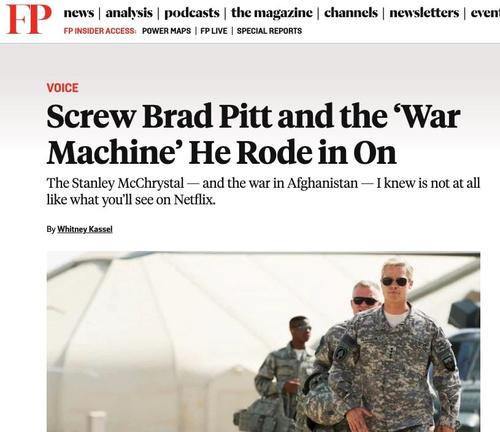The War In Afghanistan Is What Happens When McKinsey Types Run Everything
Authored by Matt Stoller via BIG Substack,
Welcome to BIG, a newsletter about the politics of monopoly. If you’d like to sign up, you can do so here.
"The Pervasiveness of Over-Optimism"
An Afghan General blames defense contractors for the collapse of the Afghan army. A government inspector blames the "the pervasiveness of overoptimism" by U.S. generals. It's all that, and more.
In 2017, Netflix put out a satirical movie on the conflict in Afghanistan. It was titled War Machine, and it starred Brad Pitt as an exuberant and deluded U.S. General named Glen McMahon. A fitness fanatic nicknamed ‘the Glanimal’ by his crew of adoring frathouse henchmen, McMahon is modeled on the real-life military leader Stanley McChrystal, who ran the surge in Afghanistan before being fired for saying disparaging things about Obama administration officials (including then VP Biden) on the record to Rolling Stone magazine.
In War Machine, McMahan comes to Afghanistan with a spirited can do attitude and a frat house of hard-partying yes-men, after having ‘kicked Al Qaeda in the sack’ running special operations in Iraq. He is obsessed with inspirational speeches and weird bureaucratic box-ticking, under the amorphous concept of leadership. This kind of leadership, though, isn’t actually working with wisdom and foresight, but is more like management consulting. Prior to arriving in Afghanistan, for instance, McMahan created a system, with the acronym SNORPP to coordinate military assets. At night, he cozies down to read books on management excellence, the kind that Harvard Business Review publishes as sort of Chicken Soup for the Executive’s Soul. He is also the author of a fictional book with the amazing title, “One Leg At a Time: Just Like Everybody Else.”
And yet his mission is unwinnable, which everyone seems to understand except him and his small team. McMahan constantly makes awkward speeches that make no sense, with the tone used by untrusted executives at corporate retreats. “We are here to build, to protect, to support the civilian population,” he told his troops. “To that end, we must avoid killing it at all costs. We cannot help them and kill them at the same time, it just ain’t humanly possible.” His character reflects what the actual government watchdog charged with overseeing the war in Afghanistan called one of the central problems with the U.S. effort, "the pervasiveness of over-optimism:"
If McMahan himself is a naive fool, he is surrounded by cynical bureaucratic opponents. As he seeks support for his new strategy of putting troops in Taliban-held provinces, he is gently ignored by the President of Afghanistan, who is a drug-addicted hypochondriac, and mocked by State Department and national security apparatchiks, who are striving cynics urging McMahon to just falsify numbers to make the war look a little better and not embarrass President Obama. Troops on the ground are demoralized and confused. No one actually believes in the mission, but dammit, McMahon is gonna get it done, whatever ‘it’ is. When McMahon tries to give an inspirational speech to ordinary Afghanis in Taliban-controlled territory about how the U.S. is going to bring them jobs and schools, one responds by saying he like jobs and schools, but please go away so the Taliban won’t retaliate. “The longer you are here the worse for us. Please go.”
It’s a hilarious, and extraordinarily dark movie. It also rang true, because it was based on the work of no-bullshit journalist Michael Hastings, who was perhaps the most honest reporter about the military establishment. And, as life is true to fiction, McChrystal, the general who Hastings profiled in Rolling Stone with an embarrassing story that led to his resignation, is now a management consultant (and board member of defense contractors). He runs inspirational ‘leadership training’ at the McChrystal Group, which is McKinsey with military branding.
In fact, McChrystal and much of our military leadership is tight with consultants like McKinsey, and that whole diseased culture from Harvard Business School of pervasive over-optimism and finance-venture capital monopoly bro-a-thons. McKinsey itself had involvement in Afghanistan, with at least one $18.6 million contract to help the Defense Department define its “strategic focus,” though government watchdogs found that the "only output [they] could find" was a 50-page report about strategic economic development potential in Herat, a province in western Afghanistan.” It turns out that ‘strategic focus’ means an $18.6 million PowerPoint. (There was reporting on this contract because Pete Buttigieg worked on it as a junior analyst at McKinsey, and he has failed upward to run the Transportation Department.)
I bring War Machine up because of today’s debate over Afghanistan. While there is a lot of back and forth about whether intelligence agencies knew that the Taliban would take over, or what would happen if we left, or whether the withdrawal could be done more competently, all you had to do to know that this war was a shitshow based on deception and idiocy at all levels was to turn on Netflix and watch this movie. Or you could read any number of inspector general reports, leaked documents, articles, talk to any number of veterans, or use common sense, which, polling showed, most Americans did. (Marine vet Lucas Kunce gives a nice rundown of the problem in this interview). I mean, it’s not like a major international media outlet printed a multi-part expose, which became a handy book, detailing the fact that everyone running the show knew it was an unwinnable mess nearly a decade ago. Oh, wait
In other words, the war in Afghanistan is like seeing management consultants come to your badly managed software company where everyone knows the problem is the boss’s indecisiveness and cowardice, except it’s violent and people die.
I mean, U.S. military leaders, like bad consultants or executives, lied about Afghanistan to the point it was routine. Here are just a few quotes from generals and DOD spokesmen over the years on the strength of the Afghan military, which collapsed almost instantly after the U.S. left.
In 2011, General David Petraeus stated, “Investments in leader development, literacy, marksmanship and institutions have yielded significant dividends. In fact, in the hard fighting west of Kandahar in late 2010, Afghan forces comprised some 60% of the overall force and they fought with skill and courage.”
In 2015, General John Campbell said that the the Afghan Army had “proven themselves to be increasingly capable,” that they had “grown and matured in less than a decade into a modern, professional force,” and, further, that they had “proven that they can and will take the tactical fight from here.”
In 2017, General John Nicholson stated that Afghan security forces had “prevailed in combat against an externally enabled enemy,” and that the army’s “ability to face simultaneity and complexity on the battlefield signals growth in capability.”
On July 11, 2021, Pentagon press secretary John Kirby said that the Afghan army has “much more capacity than they’ve ever had before, much more capability,” and asserted, “they know how to defend their country.”
Basically, look at this photo below, imagine them in camouflage, and that’s the U.S. military leadership.
The Withdrawal Anger Is *Embarrassment*
There are significant recriminations over the embarrassing media stories on the withdrawal from Afghanistan, tremendous anger that political leaders like Trump and Biden made significant mistakes in how they withdrew U.S. forces. Many of these critiques, coming from Europeans as much as American elites, are in bad faith.
Nonetheless, rather than weighing in on the merits of these arguments, I think it’s better to look at how the establishment observed a stark portrait of Afghanistan before the withdrawal, to show that the current critiques have nothing to do with operational choices.
To that end, let’s look at a review of War Machine in Foreign Policy magazine, written by one of McChrystal’s aides, Whitney Kassel, who now works at private intelligence firm The Arkin Group. In this review, Kassel noted the movie made her so upset that she started cursing, because, while there were of course mistakes, the film was totally unfair to McChrystal and demeaned the entire mission of building a safe Afghanistan. Kassel, like most of these elites, didn’t get the joke, because she is the joke.
I see the discourse on the withdrawal as a super-sized version of this Kassel’s review. The ‘Blob,’ that loose network of diplomats, ex-diplomats, generals, lobbyists, defense contractors, fancy lawyers, famous journalists, and insiders see the obvious desire for withdrawal as similar to how Kassel saw the truth-telling of Hastings and the Netflix movie. They are angry and embarrassed that they can’t hide their failures anymore. Their entire sense of self was bound up in the idea of an illusion of an unbeatable all-powerful America, even when they, like General Glen “the Glanimal” McMahon were the only ones who believed it.
And their embarrassment covers up something even more dangerous. None of these tens of thousands of Ivy league encrusted PR savvy highly credentialed prestigious people actually know how to do anything useful. They can write books on leadership, or do powerpoints, or leak stories, but the hard logistics of actually using resources to achieve something important are foreign to them, masked by unlimited budgets and public relations. It is, as someone told me in 2019 about the consumer goods giant Proctor and Gamble, where “very few white-collar workers at P&G really did anything” except take credit for the work of others.
Defense Monopolies and the Afghan Army
It’s fun to act like it was always thus, that this is how empires behave. But in fact, that’s not true. The current Blob is relatively new. And believe it or not, Western forces used to be able to actually win wars.
Going back to the last significant victory, the allies won World War II in large part for two reasons. First, the Soviet Union sacrificed 27 million people defeating the Nazis, and second, the U.S. military, government, labor, and business leaders were exceptionally good at logistics. The U.S. military had at least a dozen suppliers for each major weapons system, as well as the ability to produce its own weaponry, the government had exceptional insight into the U.S. economy, and New Dealers had destroyed the power of the Andrew Mellon and J.P. Morgan style short-term oriented financiers and monopolists who had controlled the industrial sinews of the country.
Today, this short-termism has taken over everything, including the military, which is now dominated by McKinsey-ified glory hounds without wisdom and defense contractors with market power. And this leadership class hasn’t just eroded our strategic capacity, but the very ability to conduct operations. Two days ago, Afghan General Sami Sadat published a piece in the New York Times describing why his army fell apart so quickly. He went through several important political reasons, but there was an interesting subtext about the operational capacity of a military that is so dependent on contractors for sustainment and repairs. In particular, these lines stuck out.
Contractors maintained our bombers and our attack and transport aircraft throughout the war. By July, most of the 17,000 support contractors had left. A technical issue now meant that aircraft — a Black Hawk helicopter, a C-130 transport, a surveillance drone — would be grounded.
The contractors also took proprietary software and weapons systems with them. They physically removed our helicopter missile-defense system. Access to the software that we relied on to track our vehicles, weapons and personnel also disappeared.
It’s just remarkable that contractors removed software and weapons systems from the Afghan army as they left. Remember, U.S. generals constantly talked about the strength of the Afghan forces, but analysts knew that its air force - on which it depended - would fall apart without contractors. The generals probably hadn’t really thought about the logistical problems of what dependence on contracting means. It’s just stunning that NATO forces would be trying to stand up an independent Afghan army, even as NATO contractors disarmed that army due to contracting arrangements.
I suspect the problem isn’t simply related to Afghanistan, because these kinds of problems are not isolated to the Afghan army. Last month, I noted that American soldiers are constantly complaining that bad contracting terms prevent them from fixing and using their own equipment, just as Apple stops consumers from repairing or tinkering with their iPhones. In 2019, Marine Elle Ekman noted that these problems are pervasive in the U.S. military.
Besides the broken generator in South Korea, I remembered working at a maintenance unit in Okinawa, Japan, watching as engines were packed up and shipped back to contractors in the United States for repairs because “that’s what the contract says.” The process took months.
With every engine sent back, Marines lost the opportunity to practice the skills they might need one day on the battlefield, where contractor support is inordinately expensive, unreliable or nonexistent…
While a broken generator or tactical vehicle may seem like small issues, the implications are much larger when a combat ship or a fighter jet needs to be fixed. What happens when those systems break somewhere with limited communications or transportation? Will the Department of Defense get stuck in the mud because of a warranty?
No one is invading the U.S., so these problems aren’t immediately obvious to most of us. Yet, with the collapse of the Afghan army, now we see an example of what happens when a military is too dependent on contractors, and that support system is removed (which adversaries could do to the U.S. military if they pursue certain strategies.) It turns out that the cost of not being able to repair your own equipment is losing wars.
More fundamentally, the people who are in charge of the governing institutions in our society are simply divorced from the underlying logistics of what makes them work. Everything, from the Boeing 737 Max to the opioid epidemic to the waste inside most big corporations to war, has been McKinsey-ified. And it’s all covered up with moral outrage, partisanship and culture warring, public relations, and management wisdom bullshit.
I’ll finish on a note of optimism. This loss in Afghanistan, while hugely embarrassing, could serve as a wake-up call. After the loss in Vietnam, a group of military officers, led by John Boyd, one of the greatest American military strategists in U.S. history, created a military reform movement, to change the way the Pentagon developed and used weapons, and they made enormous progress in restructuring key parts of the defense establishment. (One of the members of Boyd’s “Fighter Mafia,” Pierre Sprey, the man responsible for the remarkable A-10 Warthog, just passed away.) Similarly, the British, after losing the American Revolution, radically reformed their corrupt and antiquated systems of governance. Losing wars is a great spur to reform. It means that we as a society get to look at ourselves honestly. We may choose not to act on what we see, but we do in fact have the opportunity. And that’s not nothing.
UPDATE: I'd like to apologize to Whitney Kessel. She is no longer at the Arkin Group. After a stint at Palantir, she ended up at Morgan Stanley, where she is now the Head of Cyber Event Management for North America, which is not at all a highly paid fake job full of make work.
https://ift.tt/3t0eC5v
from ZeroHedge News https://ift.tt/3t0eC5v
via IFTTT




0 comments
Post a Comment